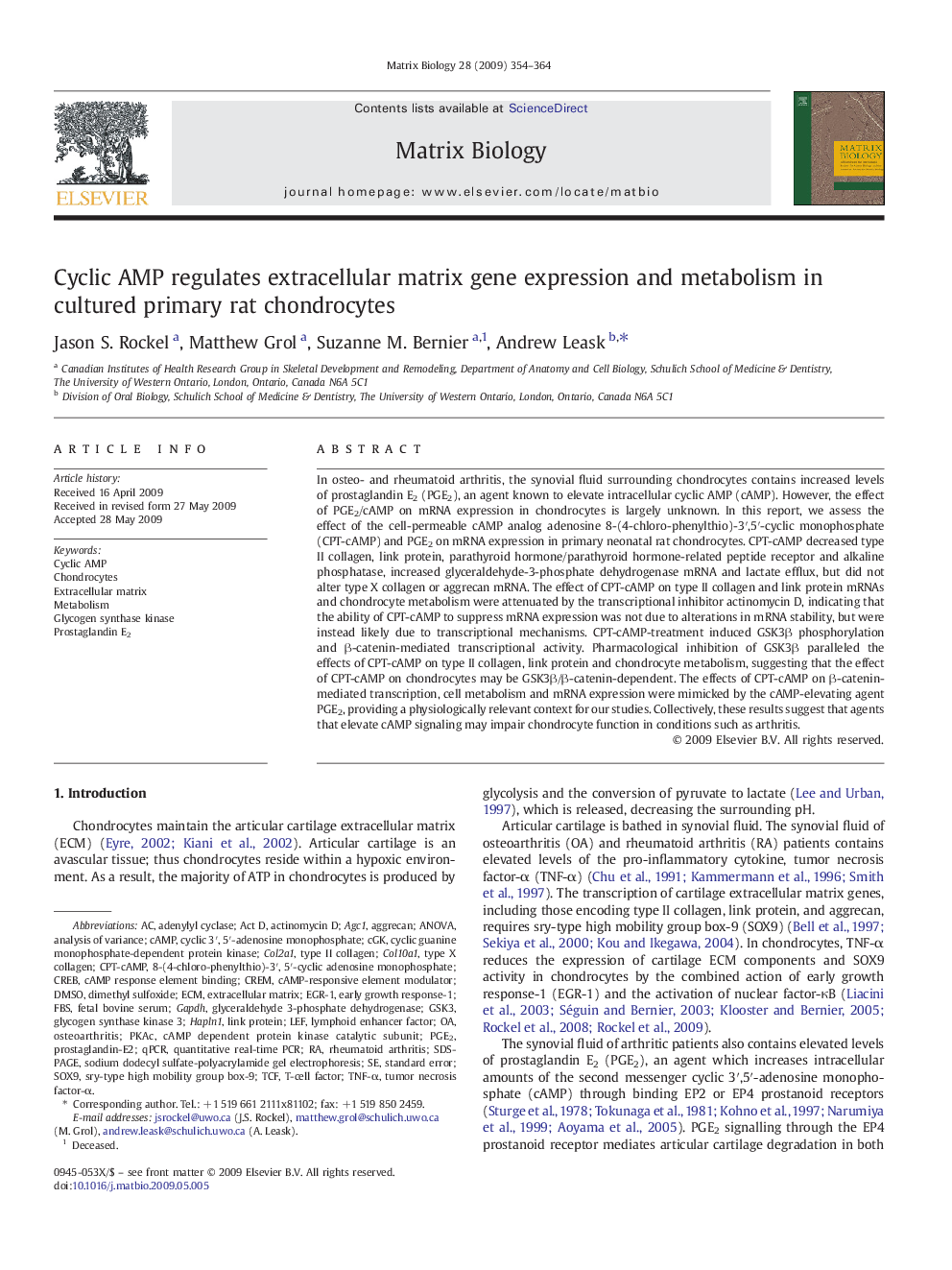| Article ID | Journal | Published Year | Pages | File Type |
|---|---|---|---|---|
| 2144965 | Matrix Biology | 2009 | 11 Pages |
Abstract
In osteo- and rheumatoid arthritis, the synovial fluid surrounding chondrocytes contains increased levels of prostaglandin E2 (PGE2), an agent known to elevate intracellular cyclic AMP (cAMP). However, the effect of PGE2/cAMP on mRNA expression in chondrocytes is largely unknown. In this report, we assess the effect of the cell-permeable cAMP analog adenosine 8-(4-chloro-phenylthio)-3â²,5â²-cyclic monophosphate (CPT-cAMP) and PGE2 on mRNA expression in primary neonatal rat chondrocytes. CPT-cAMP decreased type II collagen, link protein, parathyroid hormone/parathyroid hormone-related peptide receptor and alkaline phosphatase, increased glyceraldehyde-3-phosphate dehydrogenase mRNA and lactate efflux, but did not alter type X collagen or aggrecan mRNA. The effect of CPT-cAMP on type II collagen and link protein mRNAs and chondrocyte metabolism were attenuated by the transcriptional inhibitor actinomycin D, indicating that the ability of CPT-cAMP to suppress mRNA expression was not due to alterations in mRNA stability, but were instead likely due to transcriptional mechanisms. CPT-cAMP-treatment induced GSK3β phosphorylation and β-catenin-mediated transcriptional activity. Pharmacological inhibition of GSK3β paralleled the effects of CPT-cAMP on type II collagen, link protein and chondrocyte metabolism, suggesting that the effect of CPT-cAMP on chondrocytes may be GSK3β/β-catenin-dependent. The effects of CPT-cAMP on β-catenin-mediated transcription, cell metabolism and mRNA expression were mimicked by the cAMP-elevating agent PGE2, providing a physiologically relevant context for our studies. Collectively, these results suggest that agents that elevate cAMP signaling may impair chondrocyte function in conditions such as arthritis.
Keywords
ECMHapln1CPT-cAMPPKAcCol10a1cGKAggrecanCol2a1cAMP-responsive element modulatorEGR-1GSK3TCFPGE2GAPDHCREBSox9FBSqPCRcyclic AMPcAMPDMSOadenylyl cyclaseRheumatoid arthritisOsteoarthritissodium dodecyl sulfate-polyacrylamide gel electrophoresisSDS-PAGEcAMP response element binding actinomycin Danalysis of varianceANOVAtumor necrosis factor-αstandard errorDimethyl sulfoxidefetal bovine serumT-cell factorlymphoid enhancer factorTNF-αAct DLefExtracellular matrixMetabolismtype X collagenquantitative real-time PCRearly growth response-1Prostaglandin-E2Prostaglandin E2Link proteinCREmType II collagenChondrocytesglyceraldehyde 3-phosphate dehydrogenaseglycogen synthase kinase 3glycogen synthase kinase
Related Topics
Life Sciences
Biochemistry, Genetics and Molecular Biology
Cancer Research
Authors
Jason S. Rockel, Matthew Grol, Suzanne M. Bernier, Andrew Leask,
